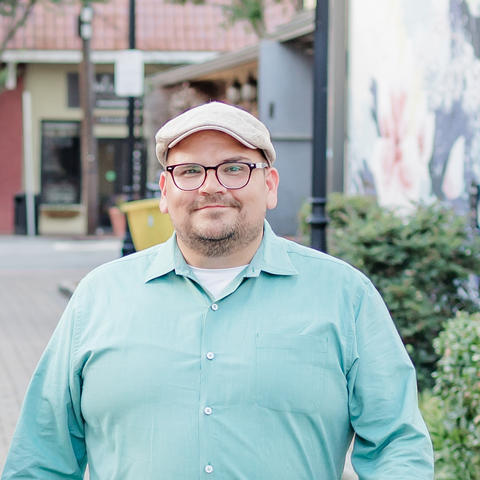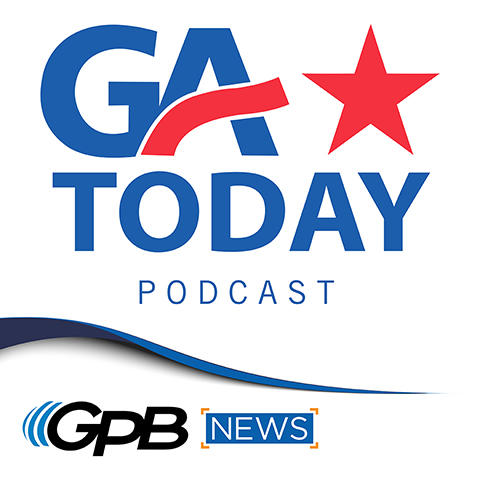
Section Branding
Header Content
Georgia Today: VP Kamala Harris in Augusta; Chemical fire hotline; Braves lose first wildcard game
Primary Content
LISTEN: On the Wednesday, Oct. 2 episode of Georgia Today: Vice President Kamala Harris visited Augusta and promised Federal funds for hurricane clean-up; there is a new hotline for persons affected by the chemical fire in Conyers; the Atlanta Braves lost the first wildcard playoff game.

Peter Biello: Welcome to the Georgia Today podcast from GPB News. Today is Wednesday, Oct. 2. I'm Peter Biello. On today's episode. Vice President Kamala Harris paid a visit to Augusta this afternoon. A new hotline helps provide answers to questions about the chemical fire in Conyers and the Braves dropped the first game of the wild card series. These stories and more are coming up on this edition of Georgia Today.
Story 1
Peter Biello: Vice President Kamala Harris visited Augusta this afternoon with promises of federal assistance in recovering from Hurricane Helene.
VP Kamala Harris: Today, I am also announcing that the president has approved the governor's request for 100% federal reimbursement of local costs. And Mayor, as you have pointed out, the burden to local governments, including state, the state government is — is pretty immense. And so by announcing today and making the dedicated resources to cover 100% of local costs will have a huge impact on our ability to get relief to people as quickly as possible.
Peter Biello: The trip also serves as a political test. With Election Day just about a month away. Both the Harris and Trump campaigns have been making overtures to voters in Georgia, which is a crucial swing state. Former President Donald Trump recently visited storm-damaged Valdosta.
Story 2
Peter Biello: Relief efforts continue in Georgia as power and water outages paralyze areas hardest hit by the hurricane. In Augusta, volunteer truck drivers rolled into town to prepare and serve thousands of hot meals at a Walmart Supercenter. Walmart Disaster Response director Brooks Nelson:
Brooks Nelson: We know the community needs water and ice and other products, and so whether we can donate it alongside the cook team that's there serving at that store or if we can donate it directly to the city, you know, we reach out to them to best understand the needs.
Peter Biello: Gov. Brian Kemp is expected to update Georgians on the state's recovery tomorrow morning in the 10:00 hour. And you can hear those remarks live on GPB and at GPB.org.
Story 3
Peter Biello: A state judge says county election boards have no legal authority to do anything but certify election results by a state-mandated deadline. Fulton County Superior Court Judge Robert McBurney made the comments during arguments yesterday over whether two new election certification rules approved by the State Election Board are legal. Members of the board's majority aligned with Donald Trump say the rules will help ensure the accuracy of vote totals. But critics worry the former president's supporters could use the rules to delay or deny certification if he loses. Although McBurney did not make a formal ruling, his message was clear.
Judge Robert McBurney: The deadline is the deadline. Get done what you can and what is reasonable to one person might be not reasonable to another, but you're making your inquiry and then it's wheels up at 5 p.m. on the 12th of November.
Peter Biello: The new rules have drawn multiple lawsuits. McBurney said he would make his rulings on them soon.
Story 4
Peter Biello: Last night, presidential running mates Ohio Sen. J.D. Vance and Minnesota Gov. Tim Walz faced off in a televised debate. GPB's Sarah Kallis reports. Georgia college students were watching.
Sarah Kallis: Students at Georgia Tech watch the debate on campus as part of a nonpartisan initiative to help engage Tech students with the election and register to vote. Freddy Wright is a biology major who attended the event. He said he enjoyed hearing the policy stances of the candidates.
Freddy Wright: I think it was a pretty good debate. I think it went a little bit more civil than the presidential debate.
Sarah Kallis: The debate referenced Georgia twice, including the Apalachee High School shooting and Amber Nicole Thurmond, a Georgia woman who died from abortion complications after the six-week abortion ban was implemented. For GPB News, I'm Sarah Kallis at Georgia Tech.
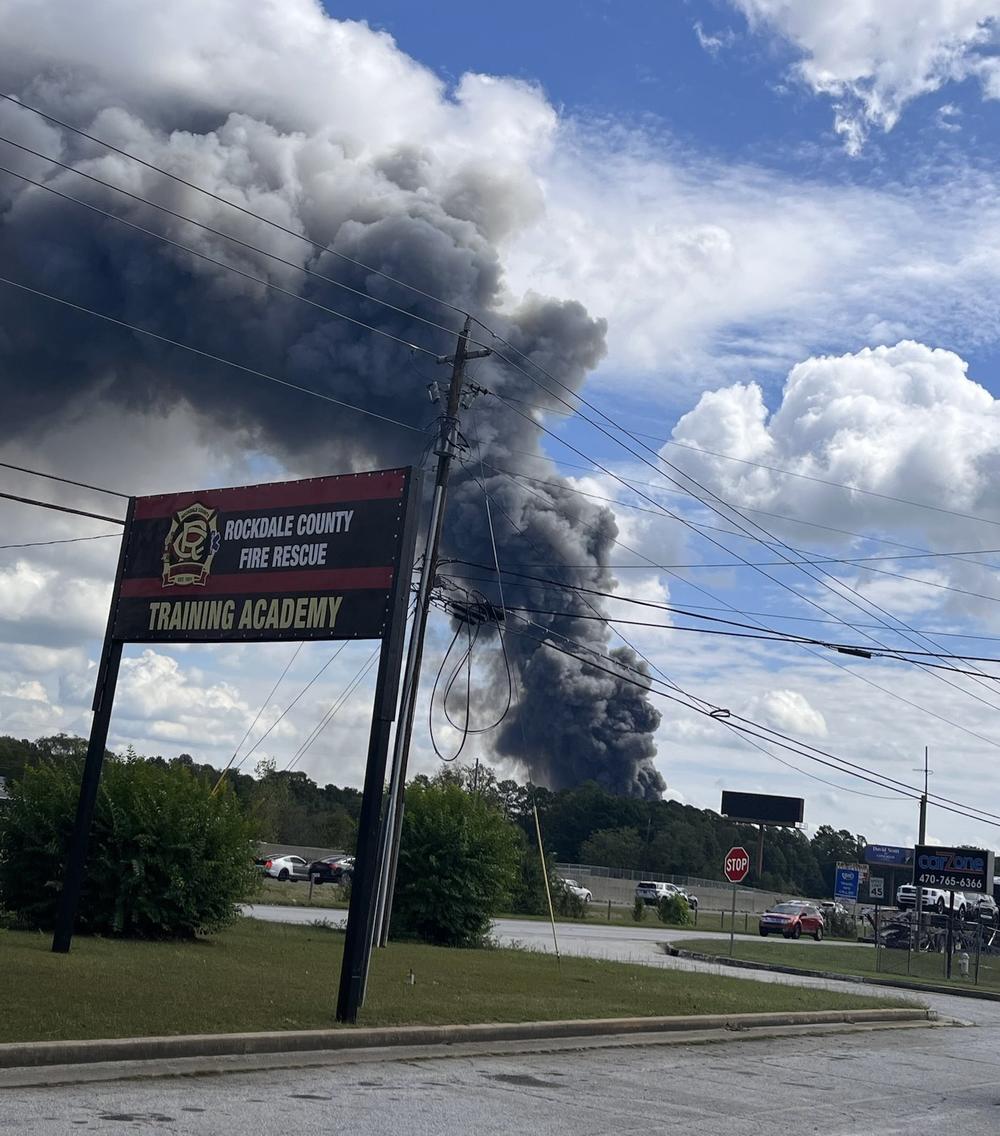
Story 5
Peter Biello: The Georgia Poison Control Center has set up a hotline for anyone with questions about a chemical fire in Conyers, east of Atlanta. GPB's Ellen Eldridge reports on the fire's possible health effects.
Ellen Eldridge: State and federal agency has found chlorine in the air around BioLabs plant after a fire Sunday. The company manufactures pool cleaning supplies. Ted Russell is an air quality expert with Georgia Tech. He says the cloud plume created by the reaction between chlorine and water is different now that the fire is out.
Ted Russell: It's not only breaking up, it's dispersing. And maybe that's the same sort of thing: is that concentrations will just get lower and lower. And again, the sunlight is bringing this down.
Ellen Eldridge: The Georgia Emergency Management Agency is also warning people that winds could shift and people in much of Atlanta could see haze and smell chlorine by Thursday morning. For GPB News, I'm Ellen Eldridge.
Story 6
Peter Biello: The ports of Savannah and Brunswick were closed for a second day today, the result of a longshoreman's strike affecting ports from Maine to Texas. Workers began walking picket lines yesterday in work stoppage over wages and the port's use of automation. The Georgia Ports Authority says it has a good working relationship with its local labor partners and is not involved in contract negotiations.
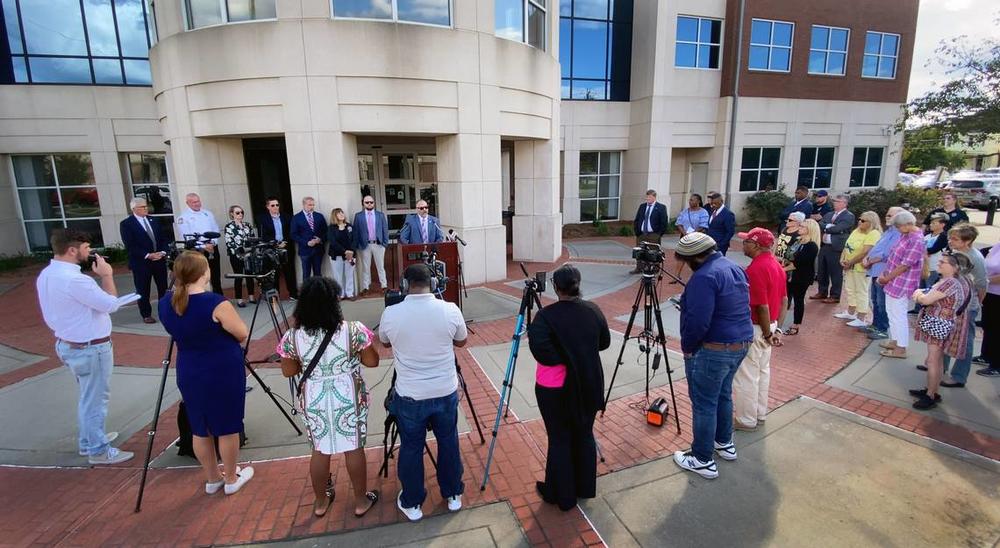
Story 7
Peter Biello: Columbus officials have announced the arrests of eight Columbus animal care and control workers on 34 criminal charges. The Columbus Council called for the investigation in July after a Facebook video showed the euthanasia of a dog named Chai at Columbus Animal Care and Control. The charges include cruelty to animals, euthanasia by unauthorized personnel, forgery and violation of oath by a public officer, among others. Columbus City Manager Isaiah Hull says the city will move to privatize Columbus Animal Care and Control, with Paws Humane Society slated to possibly take the helm.
Story 8
Peter Biello: The musical adaptation of the bestselling book Midnight in the Garden of Good and Evil is heading to Broadway next year. GPB's Benjamin Payne reports.
Benjamin Payne: The true crime bestseller set in Savannah made its stage debut in Chicago last July, opening to rave reviews.
song: Well, not gonna do now. Tim Williams. What am I gonna do now? When I try to figure out what I didn't like, I should.
Benjamin Payne: Producers haven't yet announced when the show will open in New York. But Midnight in the Garden of Good and Evil author, John Berendt, says he's excited to see it there after enjoying the Chicago production.
John Berendt: I was absolutely surprised and delighted. The direction is excellent, the dancing is terrific. The songs are very, very good. The scenery is really takes you back to Savannah and Bonaventure Cemetery, where some of the action takes place.
Benjamin Payne: Midnight was also a 1995 Pulitzer Prize finalist and a popular movie. For GPB News, I'm Benjamin Payne in Savannah.
Story 9
Peter Biello: An Atlanta poet is among 22 people in this year's batch of so-called Genius Grant recipients from the John D and Catherine T. MacArthur Foundation. 48-year-old Jericho Brown of Emory University writes lyrical work that explores contemporary culture in part through vulnerable self-reflection and experimentation in form. The foundation announced its 2024 MacArthur Fellows, each receiving an $800,000 award today after a yearslong selection process.
Story 10
Peter Biello: Yesterday, in honor of former President Jimmy Carter's 100th birthday, we broadcast All Things Considered live from the Carter Center in Atlanta. We wanted to bring you one of those conversations on the podcast today: my chat with Dot Padgett of the Peanut Brigade. When former President Jimmy Carter first campaigned for president, his was not a household name. So it took an army of volunteers to campaign in early primary battleground states, knocking on doors to introduce voters to Carter. Here's President Carter speaking to C-Span in 1998.
Jimmy Carter: I would campaign in one place, Rosalynn in another place. My oldest son Jack, and his wife and another place, my middle son and his wife in another place, my youngest son and his wife in another place. My mother in a different place and my mother's sister in a different place. We had like seven campaigns going on every day. And I only knew what was happening where I was. And we didn't know all of the vast array of volunteers like in the Peanut Brigade, so-called, who went to New Hampshire, Who went to Wisconsin, who went to other states in the nation and campaigned independently of us.
Peter Biello: The Peanut Brigade was instrumental in helping Carter sway voters in early primary states like New Hampshire. With us now is a leading member of the Peanut Brigade, Dot Padgett. Dot, thank you so much for being here with us.
Dot Padgett: It's my pleasure. And it was just wonderful to hear that voice again.
Peter Biello: Isn't it? Isn't it wonderful? We're so glad to have his voice as a part of this program. Can you tell us about the moment you met him?
Dot Padgett: The moment that I met Jimmy Carter was in 1970, and I was working in my yard pulling up weeds and loving it. And I thought, "well, what will I tell my grandchildren that I've ever done with my life?" And about that time, a car pulled up to the curb and a young man got out and I knew it was Jimmy Carter because a friend of mine had told me that he would be stopping by to see me. And I looked at him and I thought, well, he had some of the characteristics of John Kennedy, but he was not quite as tall and he wasn't quite as handsome. Jimmy Carter later told me he wrote something in my book, and he said, "I thought Paget was my friend," but she did not. He says, "But I forgive that and I still love her." That day he asked me if I would volunteer to work and help him in his campaign for governor. I was a busy mother of four children. But somehow when that man asked me to do something, I was willing to go and help him. And so I went to the campaign office the next day, and they assigned me to work with Rosalynn Carter and Miss William. And I campaigned and scheduled and traveled with them. He won that race, of course.
Peter Biello: And what was the skill set they were searching for when they came to you and asked for your help? What did they want you to do?
Dot Padgett: Well, they wanted me to work very hard for very little money.
Peter Biello: And so you did.
Dot Padgett: I did. But I was certainly I was willing to do it. And one of the reasons that was attracted me to him was the people that he had around him, the people that were advising him. They were very — some of 'em — prominent people that names that people would recognize, but they also were people that knew what we needed for the state of Georgia. And that was one of the things that attracted me to him.
Peter Biello: When I was researching ahead of our conversation, I happened to find a clip of a video where a woman knocks on the door in New Hampshire and says, "Hi, I'm Dot Padgett, and I'm here for the Carter campaign."
Dot Padgett: That's correct. New Hampshire, you had nine people in the primary that people had. So in order to set him apart, they decided to send a load of — a planeload of Georgians to New Hampshire. And that was the beginning of the Peanut Brigade. And it was a strategy that they used. I went and knocked on the door, and I — the man opened the door and I handed him a brochure, and he read. He looked at me and I gave him the entire spiel about Jimmy Carter and why I thought he would make a good president of the United States. And when I finished, he said, "I love the way you've talked about him, but I have not understood a word you have said." But he did take my brochure and he said he would read it. And so we did that over and over again. We had one woman that went up to a door, knocked on the door, and the lady came to the door. And she said, "I am so damn cold, I don't care who you vote for." So they invited her to come in and they gave her a cup of coffee and she talked about Jimmy Carter. And we were very believable. That was in New Hampshire. And then — there was no money. We had, we were under the federal election laws — that was $31 million. There was no money, but these people could donate their own money. Plane tickets, the hotels, the food, everything. And they were willing to go into different states. And before the election was over, there were 600 volunteers that had traveled in 18 states. Jimmy Carter gave us credit for being elected president because that was part of it, that Jimmy Carter was a great part of it, Rosalynn Carter and the entire family. And it was a good campaign. But these people made a difference. And they were called the Peanut Brigade.
Peter Biello: Yeah. In my research, I found a clip of Carter speaking about how he didn't know what you were doing. Like, he — he found out only when this museum was put together, the extent of the Peanut Brigade's activities, as well as, you know, his — his various family members scattering to different states. It's just a representative of a different time, isn't it, when information is not flowing back and forth? He must have had a lot of trust in you.
Dot Padgett: Well, he had to, but he knew that we wanted him to be president. We knew him personally, and we wanted — we wanted a man from Georgia. And that was a lot of what we felt, that people in Georgia actually supported him because they were so proud of the fact that we had a person and a Southerner that might be president of the United States. It — it never occurred to us that he would not be elected. We just kept thinking every day that he would. This is a man that we want him to be in the White House. And that was the reason that we were so willing to work so hard for him. But it was just Rosalynn and Jimmy are people that you have such loyalty for them. And — and it's that's one of the things that I noticed very quickly about him, that people that supported him in his first race when he ran for the Senate supported him all the way through. They're the same people that are still supporting the Carter Center. So I think you could say that about a person, and it says a lot for them when he has that amount of loyalty throughout his entire life.
Peter Biello: Well, you must have a lot of memories of him that are really meaningful to you. Can you tell us a story? Tell us one of those memories that — that really means something to you?
Dot Padgett: I do have a lot of memories of him. I remember that you decided you were going to work for Jimmy Carter, you worked very hard. And he appointed me assistant chief of protocol in Washington, D.C., and I felt the responsibility of that. And working in Washington, D.C., in — I worked for the State Department and the White House — But seeing Jimmy Carter in that role was such a — it was — meant a whole lot to me. And knowing that what he was doing and what he was doing for our country. And that's one of the things that I would like to see him rise up.
Peter Biello: His legacy?
Dot Padgett: The ranks of history — through the ranks of history as one of our better presidents. An example of that, of course, was the solar panels that he put on the White House — on the roof of the White House that heated the water. And that was very visionary. When he put those panels on the White House, he said that "Today when I put these panels here, they could be a museum piece. They could be an item of curiosity. They could be a road not taken or it could be one of the most exciting things in our life." And, of course, it has practically been all four of them, because that one office ended up in a museum. And it has been very exciting. And that's one of the things that — and of course, the other things that the, like the contributions that he made and what he's made. I like to concentrate, though, what he did as president. He there's a little thing that I read just recently, and it said, "Did you know that Jimmy Carter got the hostages released using the Iranians' own money?" They did. He had frozen the Iranian assets and that was the leverage, the leverage that was used. And so I'm delighted to be able to talk to him. And happy birthday, Jimmy. I love you.
Peter Biello: That was Dot Padgett, a founding member of the Peanut Brigade. She was one of a trio of guests we spoke to live at the Carter Center yesterday. You can find conversations with Dr. Meredith Evans, the director of the Carter Library Museum, and Steve Hartman, who helped the former president with his writing and teaching at Emory at GPB.org.
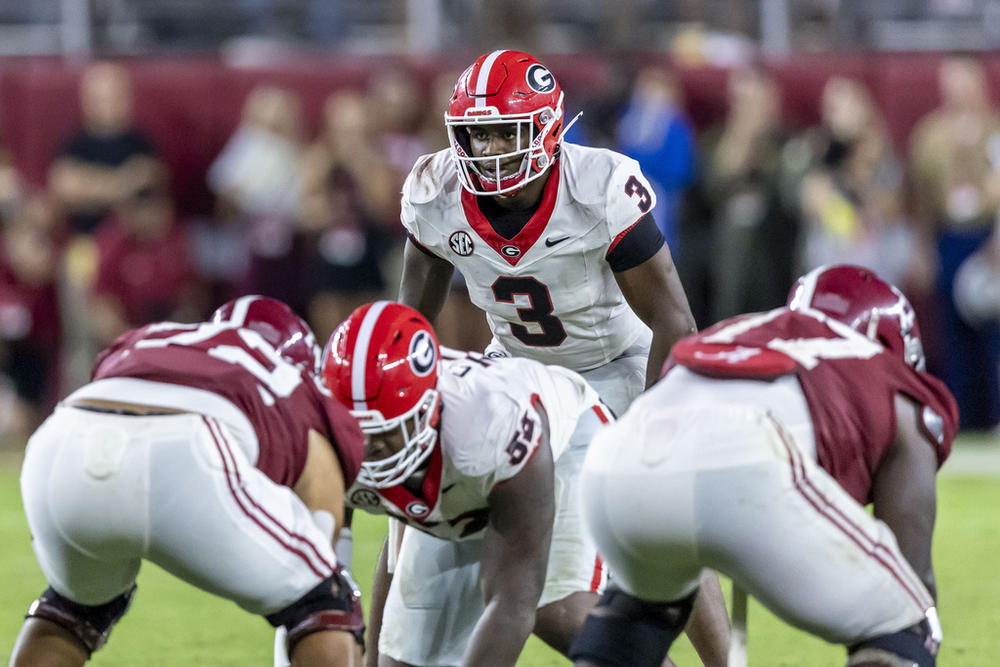
Story 11
Peter Biello: In sports, the University of Alabama versus University of Georgia football game on Saturday night averaged 12 million viewers on ABC and ESPN streaming platforms. That's according to Nielsen. It was the most watched regular season primetime game since 2017, when Alabama-Florida State, on the season's opening weekend averaged 12.3 million. It was also ESPN's most streamed regular season game. Alabama beat Georgia 41 to 34.
Story 12
Peter Biello: And in baseball, the Braves dropped their first playoff game to the Padres, 4 to nothing yesterday. Braves rookie pitcher A.J. Smith-Shawver gave up three runs in 1 1/3 innings, and the Braves struck out 15 times. The two teams face off again tonight in a must-win for the Braves in this best two of three wild card series.
And that is it for this edition of Georgia Today. You want to learn more about any of these stories, visit gpb.org/news. A great way to stay on top of the news —and there is a lot of it lately — is to subscribe to this podcast. When you do, we will pop up automatically tomorrow afternoon. And if you've got feedback or a story idea, something we should be covering, something you should know about, let us know by email. The address is GeorgiaToday@GPB.org. We always enjoy hearing from you. Emails will go to the entire team. Again, the address GeorgiaToday@GPB.org.
I'm Peter Biello. Thank you again for listening. We'll see you tomorrow.

